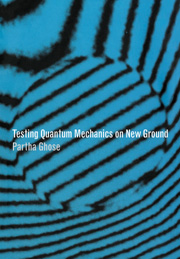Book contents
- Frontmatter
- Contents
- Preface
- Copyright acknowledgements
- 1 Wave-particle duality
- 2 Cavity quantum electrodynamics
- 3 Quantum nondemolition measurements
- 4 Topological phases
- 5 Macroscopic quantum coherence
- 6 The quantum Zeno paradox
- 7 Testing collapse
- 8 Macroscopic quantum jumps
- 9 Nonlocality
- 10 Tunneling times
- References
- Author index
- Subject index
6 - The quantum Zeno paradox
Published online by Cambridge University Press: 27 October 2009
- Frontmatter
- Contents
- Preface
- Copyright acknowledgements
- 1 Wave-particle duality
- 2 Cavity quantum electrodynamics
- 3 Quantum nondemolition measurements
- 4 Topological phases
- 5 Macroscopic quantum coherence
- 6 The quantum Zeno paradox
- 7 Testing collapse
- 8 Macroscopic quantum jumps
- 9 Nonlocality
- 10 Tunneling times
- References
- Author index
- Subject index
Summary
Introduction
Quantum theory predicts the striking and paradoxical result that when a system is continuously watched, it does not evolve! Although this effect was noticed much earlier by a number of people [146], [147], [148], [149], [150], it was first formally stated by Misra and Sudarshan [151] and given the appellation ‘Zeno's paradox’ because it evokes the famous paradox of Zeno denying the possibility of motion to a flying arrow. It is as startling as a pot of water on a heater that refuses to boil when continuously watched. This is why it is also called the ‘watched pot effect’. The effect is the result of repeated, frequent measurements on the system, each measurement projecting the system back to its initial state. In other words, the wave function of the system must repeatedly collapse. It is also necessary that the time interval between successive measurements must be much shorter than the critical time of coherent evolution of the system, called the Zeno time [152]. For decays this Zeno time is the time of coherent evolution before the irreversible exponential decay sets in, and is governed by the reciprocal of the range of energies accessible to the decay products. For most decays this is extremely short and hard to detect [153]. In the case of non-exponential time evolution, the relevant Zeno time can be much longer.
- Type
- Chapter
- Information
- Testing Quantum Mechanics on New Ground , pp. 106 - 115Publisher: Cambridge University PressPrint publication year: 1999



